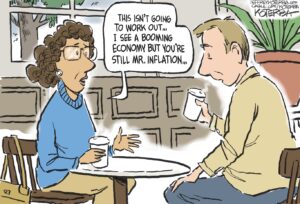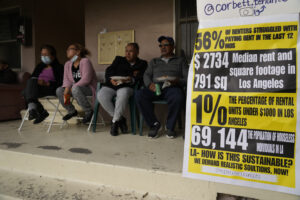Our Wallets Get Emptier
It isn't all in our heads. Americans are feeling the real effect of shrinking paychecks that can't keep up with inflation.It isn’t all in our heads. Americans did not balk at buying back-to-school clothes, or forgo a Labor Day weekend trip, or refuse to invest in a new television for football season just because they are, to use the overworked shorthand, “feeling cautious.”
They are feeling the real effect of shrinking paychecks.
Wage growth — perhaps the most important number in the torrent of economic numbers that seems to assault us daily — all but ceased in the past six months. Pay for private-sector workers grew at the rate of only 1.3 percent, according to government data analyzed by the Economic Policy Institute. That’s slower than the rate of growth late last year, when credit markets froze and it seemed as though we were about to plunge into another Great Depression.
With inflation running at more than 2 percent, no sophisticated computer is needed to do the math. Workers are, in effect, taking a net loss. “People are losing ground to inflation, big-time,” says Lawrence Mishel, president of the institute and an author of its new study, “The Recession’s Hidden Costs.”
That is, among the lucky who have managed to hold on to their jobs. They still have them, in part, because employers have cut costs by cutting pay, hours and benefits. That is what a “furlough” is — involuntary unpaid leave time. Though no official government data tracks this new trend, the EPI study estimates, based on the number of hours worked, that every week of a furlough amounts to a 2 percent cut in annual pay.
Then there is pay to be expected in retirement, or what used to be called a pension. Now, if you have a pension (and only about half the private-sector work force does) it is most likely to be in the form of a 401(k) savings account, which, as water-cooler jokers know, was knocked down to a 201(k) due to stock market losses. Or make that a 101(k) because hundreds of employers — upward of 300, according to the Pension Rights Center — have stopped or temporarily suspended employer contributions into the savings accounts.
This is only an unofficial count, based on corporate press releases and media stories. Private benefits companies that have tried to measure this trend have generally concluded that about 20 percent of employers have suspended their matching contributions, or intend to reduce them.
In mid-August, the Gallup Poll found that the fear of losing a job was at its highest level since the firm first started asking the question in 1997. About a third of those surveyed worried about a layoff, a similar proportion said they believed their pay would be cut, and 46 percent were concerned about benefit cuts.
This isn’t paranoia. For the last three decades, the economy has been on an almost uninterrupted course of lower wages and lost benefits for most workers. The current recession may well have hit bottom this summer, as government and private economists believe. But for American workers, there is no bottom.
Basic labor protections are ignored with impunity. Minimum wage laws are violated, overtime routinely goes unpaid, and workers are forced to toil off-the-clock, according to a survey of 4,387 low-wage workers in New York, Los Angeles and Chicago by the National Employment Law Project. The findings are consistent with a recent Government Accountability Office report that showed federal officials were failing to enforce basic wage and hour laws. “We have a lawless labor market, in my view,” Mishel says.
The wage crisis isn’t just the product of the current downturn. Stagnation in average Americans’ pay has been a fixture for the past decade, with real median household income — that is, income after inflation is factored in — essentially unchanged since 1999, according to the Census Bureau.
Long before this recession, workers were dodging downsizing, outsourcing, pension freezes and other benefit cuts. Years ago, the announcement that a company was moving operations offshore for cheaper labor was met with outrage. Today it is applauded on Wall Street and barely lamented in Washington. The tactics of the past are the new normal.
That is what’s worrying about the new techniques companies are using to trim costs in this slowdown. Emergency practices perfected now — suspension of the employer share of 401(k) contributions, for instance — could easily become tomorrow’s standard.
Then what? Without pay that keeps up with inflation, without pensions, without the certainty of health insurance coverage, there’s a diminishing chance that those in the much-vaunted American middle class will stay there.
Marie Cocco’s e-mail address is mariecocco(at)washpost.com.
© 2009, Washington Post Writers Group
Your support matters…Independent journalism is under threat and overshadowed by heavily funded mainstream media.
You can help level the playing field. Become a member.
Your tax-deductible contribution keeps us digging beneath the headlines to give you thought-provoking, investigative reporting and analysis that unearths what's really happening- without compromise.
Give today to support our courageous, independent journalists.






You need to be a supporter to comment.
There are currently no responses to this article.
Be the first to respond.